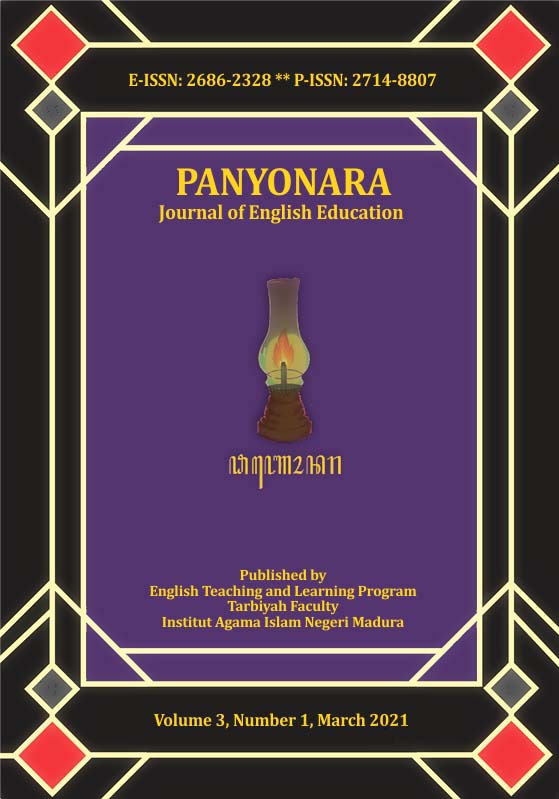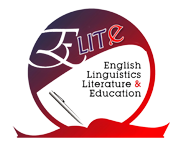The Influence of Social Media on Palestinian Secondary Schools English Writing Skills from English Teachers’ Perspectives in Jenin Region
 Abstract views: 380
,
Abstract views: 380
,
 PDF downloads: 353
PDF downloads: 353
Abstract
Writing skills play a crucial role in this modern world, and one must develop these skills to excel in teaching-learning processes. Therefore, writing becomes one of the most important abilities of all four language skills to communicate effectively in this global environment. Since English is commonly used throughout the world, learners need to acquire their writing skills to be effective in their respective fields. The teachers have to consider and seek to incorporate different teaching methods, especially social media, during these challenging times with the presence of COVID 19. This study aimed to find out the influence of social media on Palestinian secondary schools' English writing skills from teachers' perspectives in the Jenin region, and also the influence of (gender, academic qualification, and years of experience) variables in the influence of social media on Palestinian secondary school's English writing skills from teachers' perspectives in the Jenin region. The study sample consists of (30) Palestinian secondary schools English language teachers who will select randomly in the scholastic year (2019-2020). Thus, the researcher adopted the descriptive-analytic approach (quantitative method). The results show that a negative influence of social media on Palestinian secondary schools students' English writing skills
Downloads
References
Al-Sharawneh, I. (2014). Evaluation of Assessment Practices in English Writing for High School Palestinian Students: A Critical Study. Hebron: Hebron University.
Cole, M., Hibbert, D., & Kehoe, E. (2013). Students’ Perceptions of Using Twitter To Interact with the Instructor during Lectures for a Large-Enrollment Chemistry Course. Journal of Chemical Education, 90(5), 671–672. doi: 10.1021/ed3005825
Crook, C., Fisher, T., Graber, R., Harrison, C., Lewin, C., Logan, K., … Sharples, M. (2008). Web 2.0 Technologies for Learning: The Current Landscape – Opportunities, Challenges and Tensions (pp. 1–72) [Research Report]. Nottingham: University of Nottingham.
Dickie, V., & Meier, H. (2015). The Facebook Tutor: Networking Education. Ubiquitous Learning: An International Journal, 8(2), 15–20. doi: 10.18848/1835-9795/CGP/v08i02/40400
Dougherty, K., & Andercheck, B. (2014). Using Facebook to Engage Learners in a Large Introductory Course. Teaching Sociology, 42, 95–104. doi: 10.1177/0092055X14521022
Evans, C. (2014). Twitter for Teaching: Can Social Media be Used to Enhance the Process of Learning? British Journal of Educational Technology, 45(5), 902–915. doi: https://doi.org/10.1111/bjet.12099
Goktalay, B. S. (2013). Challenges Facing Higher Education: Faculty’s Concerns about Technologies of Social Media. Int. J. of Continuing Engineering Education and Life-Long Learning, 23(1), 67–90. doi: 10.1504/IJCEELL.2013.051767
Kamalodeen, V., & Jameson-Charles, M. (2016). A Mixed Methods Research Approach to Exploring Teacher Participation in an Online Social Networking Website. The International Journal of Qualitative Methods, 15, 1–14. doi: 10.1177/1609406915624578
Kavaliauskienė, G. (2010). Skills of Reading, Writing and Translating in English for Specific Purposes. The Buckingham Journal of Language and Linguistics, 3, 11–23. doi: 10.5750/bjll.v3i0.21
Khalil, A. (2002). Analysis of Errors made by Arab EFL learners. Bethlehem University, Palestine.
Kukulska-Hulme, A. (2012). Language Learning Defined by Time and Place: A Framework for Next Generation Designs. In J. E. Díaz-Vera (Ed.), Left to My Own Devices: Learner Autonomy and Mobile Assisted Language Learning (Vol. 6, pp. 1–13). Bingley, UK: Emerald Group Publishing Limited. Retrieved from http://www.emeraldinsight.com/products/books/series.htm?id=2041-272x
Lee, J., Koo, Y., & Kim, M. (2016). Enhancing Problem Solving Skills in Science Education with Social Media and an e-collaboration Tool. The New Educational Review, 43(1), 248–258. doi: 10.15804/tner.2016.43.1.21
Margaryan, A., & Littlejohn, A. (2011). Are Digital Natives a Myth or Reality?: Students’ Use of Technologies for Learning. Computers & Education, 56(2), 429–440. doi: 10.1016/j.compedu.2010.09.004
Menkhoff, T., Chay, Y. W., Bengtsson, M. L., Woodard, C. J., & Gan, B. (2015). Incorporating Microblogging (“Tweeting”) in Higher Education: Lessons Learnt in a Knowledge Management Course. Computers in Human Behavior, 51, 1295–1302. doi: 10.1016/j.chb.2014.11.063
Millrood, R. P. (2001). Modular Course in ELT Methodology. Moscow: Drofa.
Minocha, S. (2009). A Case Study-Based Investigation of Students’ Experiences with Social Software. Review of Hypermedia and Multimedia, 15(3), 245–265. doi: 10.1080/13614560903494320
Rinaldo, S., Tapp, S., & Laverie, D. (2011). Learning by Tweeting: Using Twitter as a Pedagogical Tool. Journal of Marketing Education - J Market Educ, 33(2), 193–203. doi: 10.1177/0273475311410852
Sobaih, A. E., Moustafa, M., Ghandforoush, P., & Khan, M. (2016). To Use or Not to Use? Social Media in Higher Education in Developing Countries. Computers in Human Behavior, 58, 296–305. doi: 10.1016/j.chb.2016.01.002
Solis, B. (2008). Coining the Statusphere: The Social Web’s Next Big Thing.
Suthiwartnarueput, T., & Wasanasomsithi, P. (2012). Effects of Using Facebook as a Medium for Discussions of English Grammar and Writing of Low-Intermediate EFL Students. Electronic Journal of Foreign Language Teaching, 9(2), 194–214.
Toivo, S. (2012). Social Media—The New Power of Political Influence. Brussels: Centre for European Studies.
Van den beemt, A., Thurlings, M., & Willems, M. (2019). Towards An Understanding of Social Media Use in the Classroom: A Literature Review. Technology, Pedagogy and Education, 29(8), 1–21. doi: 10.1080/1475939X.2019.1695657
Vikneswaran, T., & Krish, P. (2016). Utilising Social Networking Sites to Improve Writing: A Case Study with Chinese Students in Malaysia. Technology, Pedagogy and Education, 25(3), 287–300. doi: 10.1080/1475939X.2015.1030441
Wang, X. (2013). Why Students Choose STEM Majors: Motivation, High School Learning, and Postsecondary Context of Support. American Educational Research Journal, 50(5), 1081–1121. doi: 10.3102/0002831213488622
Zepke, N., & Leach, L. (2010). Improving Student Engagement: Ten Proposals for Action. Active Learning in Higher Education, 11(3), 167–177. doi: 10.1177/1469787410379680
The journal uses an Open Access policy under a Creative Commons Attribution-NonCommercial 4.0 International License. Authors who publish with this journal agree to the following terms:
- Authors retain copyright and grant the journal right of first publication with the work simultaneously licensed under a Creative Commons Attribution License that allows others to share the work with an acknowledgment of the work's authorship and initial publication in this journal.
- Authors are able to enter into separate, additional contractual arrangements for the non-exclusive distribution of the journal's published version of the work (e.g., post it to an institutional repository or publish it in a book), with an acknowledgment of its initial publication in this journal.
- Authors are permitted and encouraged to post their work online (e.g., in institutional repositories or on their website) prior to and during the submission process, as it can lead to productive exchanges, as well as earlier and greater citation of published work.
















